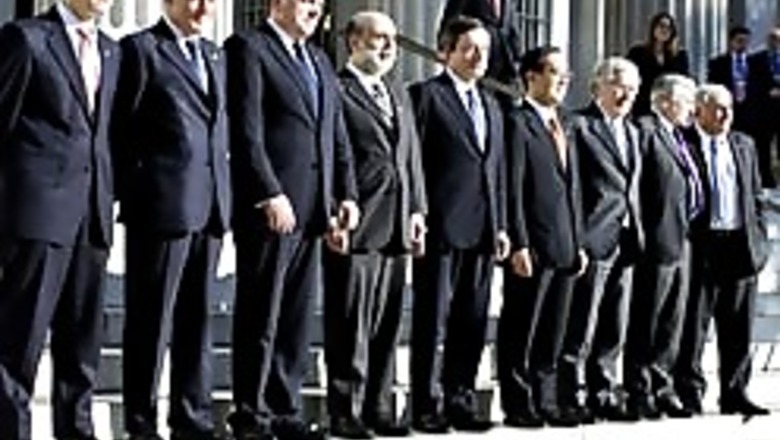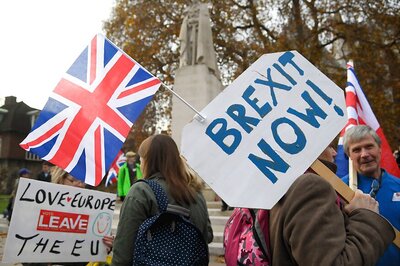
views
New Delhi: The world's seven leading economies agreed to do everything in their power to tackle a financial crisis that threatens to plunge the world into recession, but unveiled no new joint measures after their meeting.
The Group of Seven (G7) finance ministers and central bank heads said after their meeting on Friday they would use "all available tools" to stabilise the financial system and unblock credit markets that have come to a virtual halt in the United States and Europe.
US Treasury Secretary Henry Paulson called for "an aggressive action plan" and the brief reflected a common approach of the world's big economic powers.
The G7 agrees that the situation calls for an immediate action as the economies around the world are on the brinks of collapse.
- Take decisive action and use all available tools to prevent "important" institutions from failing.
- Take steps to unfreeze credit and money markets and ensure that banks and other institutions have broad access to liquidity and funding.
- Ensure that banks and other major financial intermediaries can raise enough capital from public and private sources to re-establish confidence and kick start lending to individuals and businesses.
- Ensure that each country's deposit insurance programs are strong and consistent to assure depositors their money is safe.
- Take action to restart the secondary markets for mortgages and other securitized assets.
"The G7 agrees today that the current situation calls for urgent and exceptional action," read a joint statement. Governments would "take all necessary steps to unfreeze credit and money markets".
The meeting in Washington came as stocks around the world plunged in record levels this week amid widespread fears of a global recession.
There were no specific joint moves announced, but the group did suggest all seven governments were ready to throw public funds into banks that are threatened with collapse for a lack of capital.
The seven countries promised to "ensure that our banks can raise capital from public as well as private sources in sufficient amounts to re-establish confidence and permit them to continue lending to households and businesses."
On the sidelines of the meeting, some G7 members said they were planning to take equity stakes in their banks as part of a broader rescue plan and injection of capital.
Treasury Secretary Henry Paulson said the US would buy shares in financial institutions in return for taking on their troubled mortgage assets, under authority already granted in the $700-billion rescue package approved by Congress last week.
German Finance Minister Peer Steinbrueck said a similar plan for Germany would be unveiled on Monday. Britain passed its own bail-out package earlier this week.
PAGE_BREAK
Steinbrueck said the G7 had adopted a "far-reaching" action plan that included a promise to protect all banks of "systemic relevance" to the global financial sector.
But the G7 statement was a sign of the group's reluctance to offer a common, cross-border solution to shore up banks on the brink of bankruptcy in their own countries.
Italian Finance Minister Giulio Tremonti complained the statement was "too weak" shortly before it was adopted, according to Bloomberg News.
But Paulson defended the lack of specifics coming out of the G7 meeting and said no one had any reason to expect a one-size-fits all solution.
"Some in the markets are naive if they think that different countries with different financial systems, economies in different stages of development, economies with totally different structures and different political systems, different laws are going to come up with precisely the same policy to deal with the issues," he said.
He called the statement an "aggressive action plan to address the turmoil in global financial markets and the stresses on our financial institutions."
The G7 bloc also promised "robust" guarantees for the savings deposits of consumers, but did not specify a level. A number of countries have raised guarantees to ease people's fears over the safety of their bank savings. Some in Europe such as Ireland have extended full guarantees, prompting a few concerns over competition.
IMF Managing Director Dominique Strauss-Kahn warned Friday that the only way to restore market confidence was through "government intervention which is clear, comprehensive and cooperative among countries".
The G7 meeting came at a time when there have been suggestions that the bloc is an outdated tool to manage a crisis that has spread well beyond the United States and Europe. A group of 24 countries also meeting Friday urged wealthier nations to include them in talks on resolving the financial turmoil.
Paulson will meet finance ministers from the Group of 20 - which brings together the top advanced and emerging economies - later Saturday, in a nod to the spreading nature of the crisis.
Strauss-Kahn on Thursday said the world was on the "cusp" of a recession after the IMF forecast global growth of 3 percent next year. Growth below 3 percent is considered a global recession by the IMF.
The International Monetary Fund and World Bank also hold their annual meetings this weekend.


















Comments
0 comment